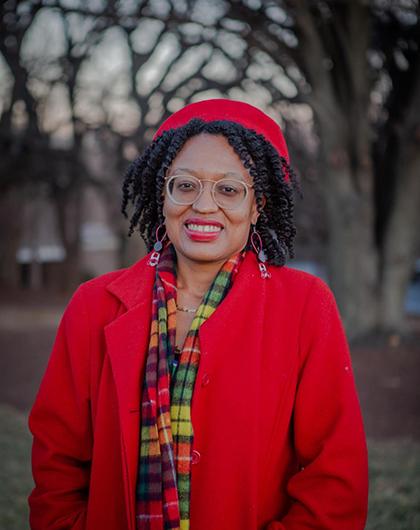Scholars
Frances Roberts-Gregory
Harvard University
Based in
United States
North America
Frances Roberts-Gregory is a feminist political ecologist and environmental anthropologist, researching the role of U.S. Afrodiasporic communities and women of color in UNFCCC climate negotiations and feminist climate policy. She is currently an Environmental Fellow at the Harvard University Center for the Environment (HUCE).
Frances earned a BA in Environmental Studies, Sociology, & Anthropology from Spelman College and earned a PhD in Environmental Science, Policy & Management from the University of California, Berkeley. She later completed a Future Faculty Fellowship in the School of Law at Northeastern University. Her dissertation research investigates how Gulf Coast Black and Indigenous women within Louisiana’s river and bayou parishes navigate contradictory relationships with energy & petrochemical industries and resist state corporate crime and environmental violence. By exploring multi-scalar strategies of everyday resistance, her feminist activist research engages questions of environmental governance through just transitions while advocating for abolitionist energy and climate justice. She also innovates feminist mixed methods through the development of ecowomanist (auto)ethnography (EWAE) as methodological intervention.
Frances taught gender, environmental communications, and climate justice at Tulane University, Bard Early College New Orleans, and the University for Peace in Costa Rica. She formerly consulted for the Deep South Center for Environmental Justice as a co-manager of the Gulf Equity Youth Water Corps Project and the C40 and City of New Orleans Women4Climate Mentorship Program. She later served as a Climate Justice Program Officer for the Foundation for Louisiana and advanced leadership development as a Program Director at the Initiative for Energy Justice. She published chapters in the Routledge Handbook on the Green New Deal and Mapping Gendered Ecologies: Engaging with and Beyond Ecowomanism and Ecofeminism and articles within Women, Gender, and Families of Color, Anthropology News, Edge Effects, and Geoforum. Frances currently serves as an advisory board co-chair for the HIVE Fund for Climate & Gender Justice and advances the Feminist Agenda for a Green New Deal at UNFCCC COPs through the Women and Gender Constituency (WGC).

Country(ies) of Specialty
United StatesFocus areas of expertise
Climate JusticePublications
Articles
Roberts-Gregory, F. 2021. “Climate Justice in the Wild n’ Dirty South: An Autoethnographic Reflection on Ecowomanism as Engaged Scholar-Activist Praxis before and during COVID-19.” Pp. 125-146 in Mapping Gendered Ecologies: Engaging with and Beyond Ecowomanism and Ecofeminism. K Melchor Quick Hall and Gwyn Kirk (Eds). Lanham: Lexington Books.
Roberts-Gregory, F. 2020. “Surviving Departmental Toxicity: An Autoethnographic Reflection of Navigating Gendered and Racialized Violence in Environmental Science, Policy, and Management.” Women, Gender, and Families of Color 8(2): 126-133.
Roberts-Gregory, F. 2020. “My Petrochemical Love.” Anthropology News website, April 22, 2020. DOI: 10.1111/AN.1387
Roberts-Gregory, F. 2020. “On Being the (Only) Black Feminist Environmental Ethnographer in Gulf Coast Louisiana.” Edge Effects
Roberts-Gregory, F. 2019. “I do not drive in the South….And here’s why.” ViaNolaVie
Roberts-Gregory, F. and Hawthorne, T.L. 2016. “Transforming Green Walls into Green Places: Black middle class boundary work, fractured communication and greenspace accessibility in southwest Atlanta.” Geoforum 77: 17-27.


